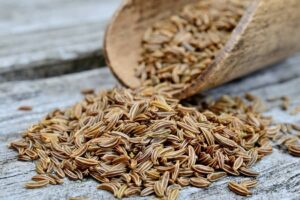Black seed fruits, also known as black cumin or Nigella sativa, have gained immense popularity due to their exceptional nutritional value and potential health benefits. These small, dark seeds have been used for centuries in traditional medicine and culinary practices. In this article, we will delve into the nutritional profile of black seed fruits, their medicinal properties, culinary uses, cultivation, availability, potential side effects, and future research prospects.
Nutritional Profile of Black Seed Fruits:
Black seed fruits are packed with essential nutrients such as vitamins (A, B, C, and E), minerals (calcium, iron, magnesium, and zinc), and dietary fiber. They are also a rich source of healthy fats, including omega-3 and omega-6 fatty acids. These nutrients contribute to overall well-being and support various bodily functions.
Medicinal Properties of Black Seed Fruits:
Black seed fruits have a long history of traditional medicinal use, particularly in Middle Eastern, Asian, and African cultures. Scientific studies have revealed their potential therapeutic properties, including antioxidant, anti-inflammatory, antimicrobial, and immune-enhancing effects. These properties make black seed fruits beneficial in managing conditions such as allergies, respiratory issues, digestive disorders, and skin problems.
Culinary Uses of Black Seed Fruits:
Black seed fruits add a unique flavor and aroma to culinary creations. They are commonly used as a spice in various cuisines, including Middle Eastern, Indian, and North African dishes. The seeds can be ground and sprinkled over bread, pastries, salads, and soups. They are also infused in oils and used for flavoring meat, fish, and vegetable dishes. Additionally, black seed fruit extracts are utilized in the production of herbal teas and beverages.
Cultivation and Availability of Black Seed Fruits:
Black seed fruits are primarily cultivated in regions with a Mediterranean climate, such as the Middle East, North Africa, and parts of Asia. They require well-drained soil, ample sunlight, and moderate temperatures for optimal growth. The popularity of black seed fruits has led to their availability in various forms, including whole seeds, ground powder, oils, and supplements, in local markets and online stores worldwide.
Potential Side Effects and Precautions:
While black seed fruits are generally safe for consumption, some individuals may experience allergic reactions or digestive discomfort. It is advisable to start with small quantities and monitor any adverse reactions. Pregnant and breastfeeding women should consult their healthcare providers before incorporating black seed fruits into their diet. Additionally, it is important to source black seed fruits from reputable suppliers to ensure quality and purity.
Future Research and Development:
The growing interest in black seed fruits has sparked increased scientific research. Researchers are exploring their potential benefits in areas such as cancer prevention, cardiovascular health, and neurological disorders. Further studies are needed to better understand the mechanisms of action and potential interactions with medications, paving the way for more targeted and evidence-based applications.
FAQ About black seed fruits
- What are black seed fruits?
Black seed fruits, also known as black cumin or Nigella sativa, are small, dark seeds that come from a flowering plant native to Southwest Asia and the Middle East. - What are the health benefits of black seed fruits?
Black seed fruits have been traditionally used for their potential medicinal properties, including antioxidant, anti-inflammatory, antimicrobial, and immune-enhancing effects. They may help manage conditions such as allergies, respiratory issues, digestive disorders, and skin problems. - How do you use black seed fruits in cooking?
Black seed fruits are commonly used as a spice in various cuisines, including Middle Eastern, Indian, and North African dishes. The seeds can be ground and sprinkled over bread, pastries, salads, and soups. They are also infused in oils and used for flavoring meat, fish, and vegetable dishes. - Are black seed fruits safe to consume?
Black seed fruits are generally safe for consumption, but some individuals may experience allergic reactions or digestive discomfort. It is advisable to start with small quantities and monitor any adverse reactions. - Can black seed fruits be used for weight loss?
There is limited scientific evidence to support the use of black seed fruits for weight loss. However, their fiber content may help promote feelings of fullness and reduce calorie intake. - How do you store black seed fruits?
Black seed fruits should be stored in an airtight container in a cool, dry place away from sunlight. Whole seeds can last up to two years, while ground powder should be used within six months. - Where can I buy black seed fruits?
Black seed fruits are widely available in local markets and online stores worldwide. It is important to source them from reputable suppliers to ensure quality and purity. - Can black seed fruits be used in skincare?
Black seed oil, derived from black seed fruits, has been used in traditional medicine for its potential skin-healing properties. It may help reduce inflammation, soothe irritation, and promote healthy skin. - Are there any side effects of black seed fruits?
While black seed fruits are generally safe for consumption, some individuals may experience allergic reactions or digestive discomfort. Pregnant and breastfeeding women should consult their healthcare providers before incorporating black seed fruits into their diet. - What is the recommended dosage of black seed fruits?
There is no official recommended dosage of black seed fruits. It is advisable to start with small quantities and monitor any adverse reactions. Consultation with a healthcare provider is recommended for specific dosing instructions.
Conclusion:
Black seed fruits are not only a culinary delight but also offer a range of potential health benefits. Their impressive nutritional profile, medicinal properties, and versatility in cooking make them a valuable addition to a balanced diet. While enjoying the flavors and exploring the potential benefits, it is essential to be mindful of individual sensitivities and consult healthcare professionals when necessary. As research continues to unfold, black seed fruits hold promise for enhancing well-being and shaping future advancements in the field of natural medicine.



